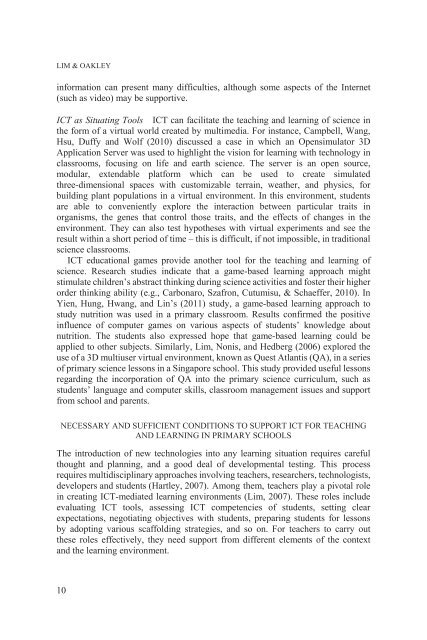1517-creating-holistic-technology-enhanced-learning-experiences
1517-creating-holistic-technology-enhanced-learning-experiences
1517-creating-holistic-technology-enhanced-learning-experiences
You also want an ePaper? Increase the reach of your titles
YUMPU automatically turns print PDFs into web optimized ePapers that Google loves.
LIM & OAKLEY<br />
information can present many difficulties, although some aspects of the Internet<br />
(such as video) may be supportive.<br />
ICT as Situating Tools ICT can facilitate the teaching and <strong>learning</strong> of science in<br />
the form of a virtual world created by multimedia. For instance, Campbell, Wang,<br />
Hsu, Duffy and Wolf (2010) discussed a case in which an Opensimulator 3D<br />
Application Server was used to highlight the vision for <strong>learning</strong> with <strong>technology</strong> in<br />
classrooms, focusing on life and earth science. The server is an open source,<br />
modular, extendable platform which can be used to create simulated<br />
three-dimensional spaces with customizable terrain, weather, and physics, for<br />
building plant populations in a virtual environment. In this environment, students<br />
are able to conveniently explore the interaction between particular traits in<br />
organisms, the genes that control those traits, and the effects of changes in the<br />
environment. They can also test hypotheses with virtual experiments and see the<br />
result within a short period of time – this is difficult, if not impossible, in traditional<br />
science classrooms.<br />
ICT educational games provide another tool for the teaching and <strong>learning</strong> of<br />
science. Research studies indicate that a game-based <strong>learning</strong> approach might<br />
stimulate children’s abstract thinking during science activities and foster their higher<br />
order thinking ability (e.g., Carbonaro, Szafron, Cutumisu, & Schaeffer, 2010). In<br />
Yien, Hung, Hwang, and Lin’s (2011) study, a game-based <strong>learning</strong> approach to<br />
study nutrition was used in a primary classroom. Results confirmed the positive<br />
influence of computer games on various aspects of students’ knowledge about<br />
nutrition. The students also expressed hope that game-based <strong>learning</strong> could be<br />
applied to other subjects. Similarly, Lim, Nonis, and Hedberg (2006) explored the<br />
use of a 3D multiuser virtual environment, known as Quest Atlantis (QA), in a series<br />
of primary science lessons in a Singapore school. This study provided useful lessons<br />
regarding the incorporation of QA into the primary science curriculum, such as<br />
students’ language and computer skills, classroom management issues and support<br />
from school and parents.<br />
NECESSARY AND SUFFICIENT CONDITIONS TO SUPPORT ICT FOR TEACHING<br />
AND LEARNING IN PRIMARY SCHOOLS<br />
The introduction of new technologies into any <strong>learning</strong> situation requires careful<br />
thought and planning, and a good deal of developmental testing. This process<br />
requires multidisciplinary approaches involving teachers, researchers, technologists,<br />
developers and students (Hartley, 2007). Among them, teachers play a pivotal role<br />
in <strong>creating</strong> ICT-mediated <strong>learning</strong> environments (Lim, 2007). These roles include<br />
evaluating ICT tools, assessing ICT competencies of students, setting clear<br />
expectations, negotiating objectives with students, preparing students for lessons<br />
by adopting various scaffolding strategies, and so on. For teachers to carry out<br />
these roles effectively, they need support from different elements of the context<br />
and the <strong>learning</strong> environment.<br />
10


